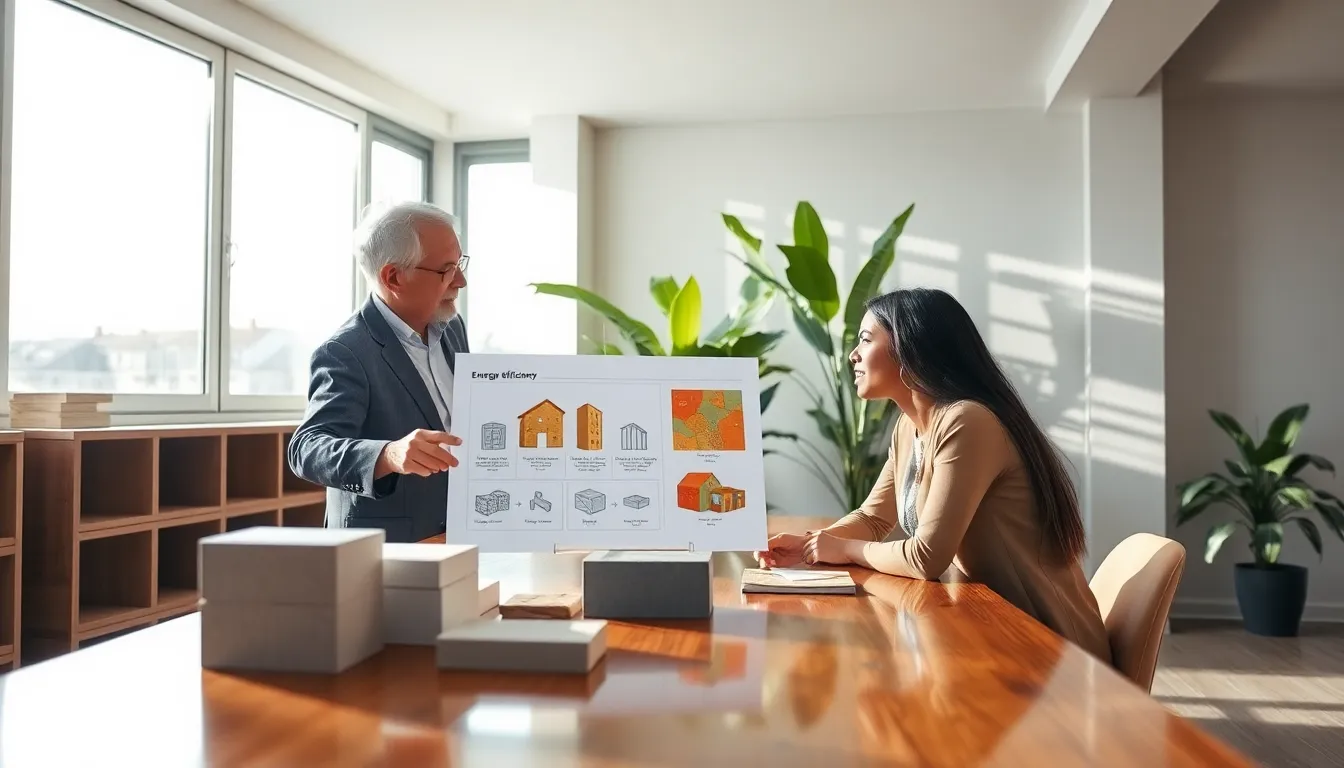Table of Contents
ToggleWhen thinking about your dream home, energy efficiency is probably high on your list, right next to having a secret cookie compartment in the kitchen. But if you’ve ever pondered building with concrete blocks, you might be wondering: are they energy efficient? Spoiler alert: they absolutely can be. In this text, we’ll dig deep into the surprisingly efficient world of concrete block homes while sharing some laughs along the way. So grab your hard hat and let’s get to the nitty-gritty of concrete.
Understanding Energy Efficiency in Homes

Energy efficiency refers to how well a home uses energy to maintain comfortable temperatures and good air quality. A home that is energy-efficient requires less energy for heating and cooling, leading to lower utility bills and a smaller carbon footprint. In essence, energy efficiency is about getting the most out of the energy you consume, and who doesn’t want to save some cash while also saving the planet?
In evaluating energy efficiency, two critical aspects come into play: the building materials used and the insulation properties of the home. With these factors in mind, let’s explore how concrete block homes fit into the energy-efficient picture.
The Role of Insulation in Concrete Block Homes
Insulation might just be the unsung hero of any energy-efficient dwelling. It keeps spaces warm in winter and cool in summer. Ideally, insulation works by slowing the transfer of heat, keeping the comfortable air you’ve paid for exactly where you want it, inside your home. Now, you might think that concrete blocks, being solid and heavy, do a great job of keeping heat out. But here’s the kicker: their effectiveness can be dramatically enhanced with proper insulation.
Concrete block homes can be insulated with foam board, spray foam, or fiberglass batts, significantly improving their thermal performance. When adequately insulated, these homes can outperform many traditional frame constructions in maintaining an ideal indoor climate, all while keeping your energy bills manageable.
Benefits of Concrete Block Construction
Concrete block construction comes with some impressive perks that go beyond mere energy efficiency. First and foremost is durability. Concrete block homes can withstand harsh weather, resist termites, and hold up against rot. This durability means fewer repairs over time, translating directly into lower long-term costs.
Also, concrete block homes offer excellent sound insulation. Think about it, whether you love hosting raucous gatherings or prefer some peace and quiet, the sound-dampening properties of concrete can significantly improve your lifestyle. Finally, let’s not forget their potential for sustainability. Concrete blocks can be made from recycled materials, making them a great option for environmentally conscious homeowners.
Potential Drawbacks of Concrete Block Homes
Of course, it wouldn’t be a complete picture without talking about the potential drawbacks. One immediate concern with concrete block homes is their thermal mass. While this property can help stabilize indoor temperatures, too much thermal mass can lead to issues if the climate isn’t temperate enough. For instance, in extreme heat, concrete can absorb and retain warmth, making cooling less effective.
Also, the initial costs of building with concrete blocks might be higher than conventional wood frame construction. While concrete blocks offer longevity and durability, homeowners must weigh the upfront costs against long-term benefits, including lower energy bills and reduced maintenance. Finally, there’s the aesthetic to consider: some people feel that concrete block homes lack the charm of traditional designs. But beauty is in the eye of the beholder, right?
Comparative Analysis: Concrete Block vs. Traditional Frame Homes
When considering energy efficiency, a comparison between concrete block and traditional frame homes can be illuminating. Traditional homes often use lightweight materials that can be easily insulated, but they don’t have the same inherent mass that concrete offers. Typically, a traditional frame home will require more energy in extreme weather conditions, particularly in regions with temperature swings.
On the flip side, concrete block homes maintain steady indoor temperatures with less energy input. Studies have shown that these homes can use as much as 20% less energy for heating and cooling than their traditionally framed counterparts. So, when going head-to-head, concrete blocks can often take the championship belt in energy efficiency, provided they are optimized correctly.
Optimizing Energy Efficiency in Concrete Block Homes
So, how can homeowners maximize the energy efficiency of their concrete block homes? First, embracing the importance of high-quality insulation is crucial. It is vital to target energy loss areas like attics and basements.
Also, installing energy-efficient windows and doors can make a significant impact. These features help mitigate drafts and improve overall thermal performance. Incorporating energy-efficient HVAC systems can also contribute substantially to maintaining optimal temperature control in the home. Beyond these elements, using reflective roofing materials can reduce heat absorption, keeping your concrete block home cool in the warmer months.




